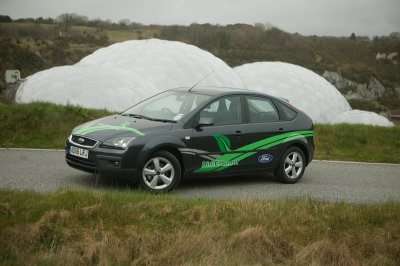|
| |||||
|
Ford Joins UK's New Eco Rally
27th May, 2007 | ||||
|
Future and current Ford vehicles leading the auto industry towards reduced carbon emissions will be part of the first Brighton to London eco rally on 5th June, 2007. While the London to Brighton Veteran Car Run marks the abolition of the 'Red Flag Act' requiring a man on foot to precede motorised vehicles, next month's eco rally follows the route in reverse to bring tomorrow's alternative fuel technologies to the British capital. A Ford hydrogen-powered Fuel Cell Vehicle (FCV) will be the centrepiece of the blue oval's line up crossing the Trafalgar Square finish line. The Ford Explorer FCV prototype will be Europe's first glimpse of the latest North America-developed fuel cell system achieving a range of 350 miles on the zero-emission fuel. Accompanying the advanced-technology FCV will be Ford Focus Flexifuel cars, representing low-carbon models that are on sale now. Roelant de Waard, Ford of Britain chairman, said: "Ford and rally organisers Revolve are closely aligned in promoting sustainable transport solutions such as FCVs, hydrogen, biofuels and other options. This rally will deepen the understanding of greener motoring – not least among the welcoming party of politicians at Trafalgar Square." Coming to the UK from Ford's Advanced Vehicle Research Centre in Aachen, Germany, the FCV will be driven on the rally by Quentin Willson. The Aachen Research Centre is currently running the vehicle as part of its participation in Germany's fuel cell vehicle test programme, which includes real-world testing in Berlin where a pilot hydrogen refuelling infrastructure operates. FCVs run on electricity generated from a fuel cell stack. In the stack, oxygen and hydrogen are combined to produce electricity, with water vapour as the harmless by-product. The electricity is used to power a motor/transaxle, which drives the wheels. While Ford has made strides in hydrogen storage capacity – a crucial area for
a fuel cell to achieve a travel range comparable to today's cars – other
challenges remain between FCVs becoming commercially viable. Most significant
are:
Low-carbon technology represented in the eco rally which is affordable now is the Ford Flexifuel range. Ford Focus and C-MAX Flexifuel bioethanol/petrol cars cost the same as equivalent petrol-only models. The Ford Focus was the first Flexifuel car on sale in Britain and in early 2008 Flexifuel versions of the new Ford Mondeo plus S-MAX and Galaxy models will be added. Existing clean diesel engines are also increasingly recognised for their low CO 2 credentials. | |||||
ABN 47106248033 |
 |
All rights reserved. |
